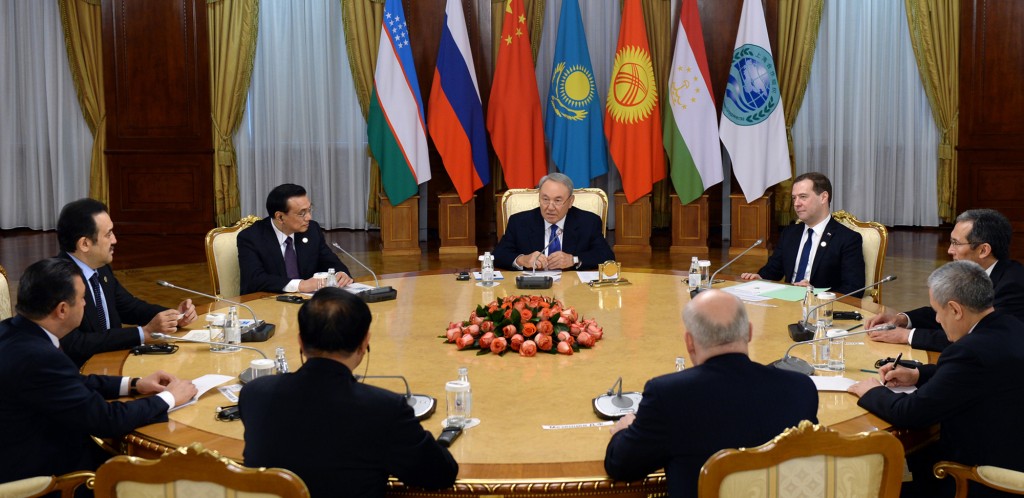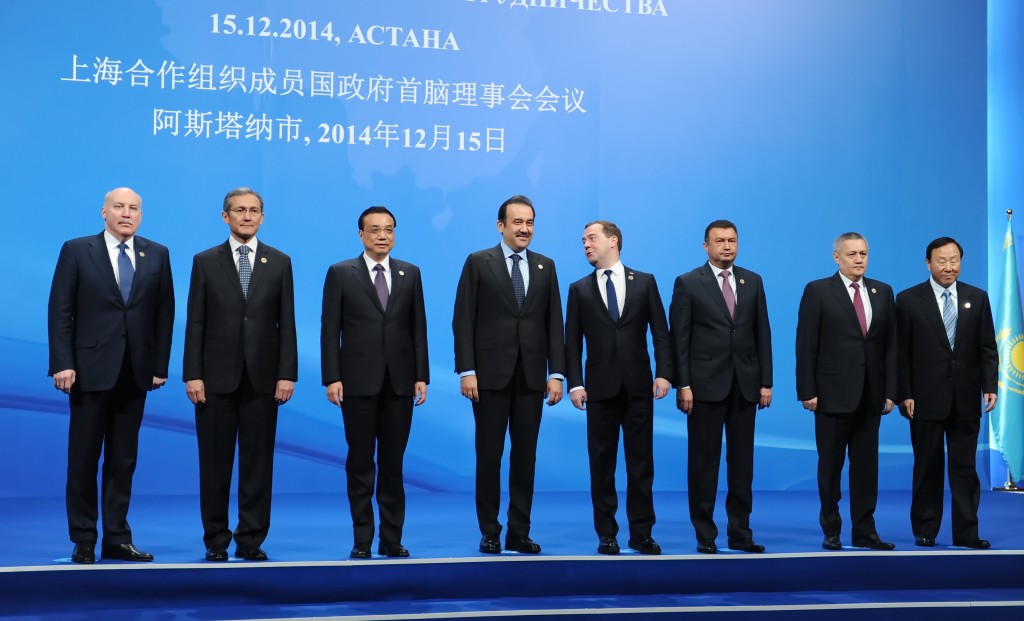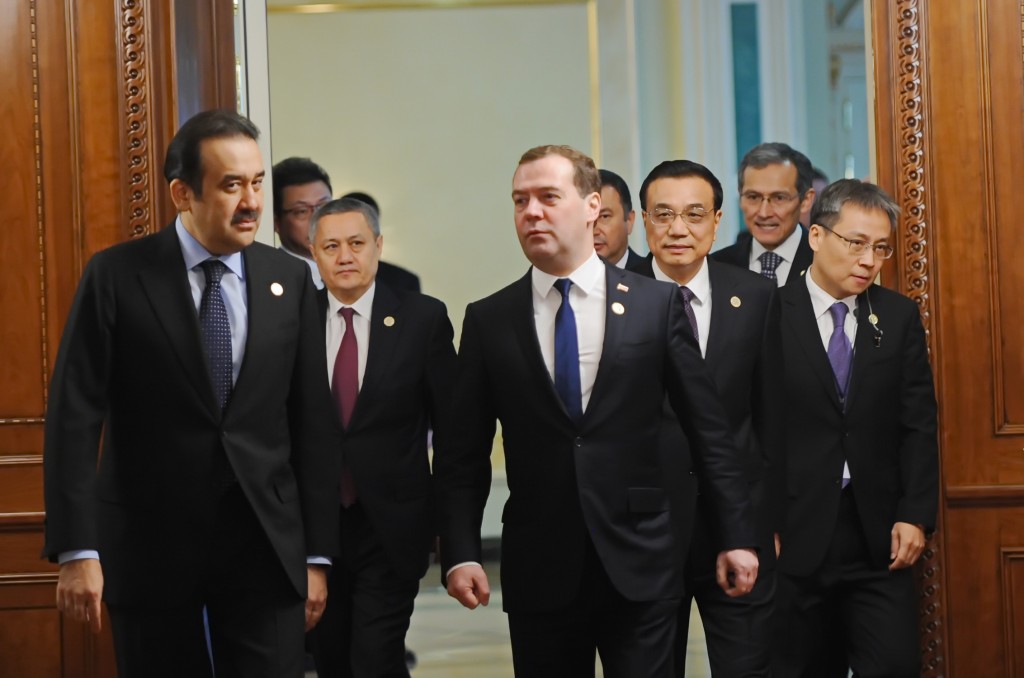ASTANA – The heads of the governments of the Shanghai Cooperation Organisation (SCO) states met in Astana’s Palace of Independence on Dec.15 to examine ways to deepen trade, economic and humanitarian relations within the organisation. This is the third time the SCO heads of governments have met in Kazakhstan.
 “The organisation is gaining political clout and economic power. Today, its voice is heard everywhere. Today’s meeting is a landmark, and we always say that we must have ‘Shanghai Spirit,’” President of Kazakhstan Nursultan Nazarbayev said when meeting the SCO heads of government prior to their separate set of meetings.
“The organisation is gaining political clout and economic power. Today, its voice is heard everywhere. Today’s meeting is a landmark, and we always say that we must have ‘Shanghai Spirit,’” President of Kazakhstan Nursultan Nazarbayev said when meeting the SCO heads of government prior to their separate set of meetings.
Prior to the SCO meeting, Nazarbayev met Prime Minister of Russia Dmitry Medvedev, Premier of China’s State Council Li Keqiang, Prime Minister of the Kyrgyz Republic Joomart Otorbayev, Prime Minister of Tajikistan Kohir Rasulzoda, First Deputy Prime Minister and Finance Minister of Uzbekistan Rustam Azimov, SCO Secretary General Dmitry Mezentsev and Director of the Executive Committee of the SCO’s Regional Counter-Terrorism Structure Zhan Xinfeng.
“The organisation works primarily for the sake of stability, the lessening of territorial disputes among [member states] and the joint fight against the three evils of our time: separatism, extremism and terrorism. We also need to address issues of food, environmental and energy security. The SCO states have the capacity to meet their needs in energy and food. In the framework of joint work, we can also solve problems of water scarcity and access to other resources,” Nazarbayev stated. He noted that the upcoming SCO Council of Heads of State in Ufa, Russia in 2015 is expected to approve the development strategy of the organisation to 2025, emphasising that Kazakhstan supports the initiative of establishing the SCO Development Bank.
Addressing the need to focus on developing transport cooperation within the SCO, Nazarbayev underlined Kazakhstan’s important ongoing transport projects, including the Western Europe – Western China highway, which is expected to promote the development of the national economy as well as intensify bilateral trade and business relations throughout the region. At the meeting with the Chinese premier, Nazarbayev highlighted joint Kazakh-Chinese work on the construction of the Khorgos trade centre, railways and roads to ensure transit through the country.
“In this context, we support China’s initiative to revive the Silk Road and create the fund and bank for infrastructure projects,” he added.
 During the council, participants underlined that currently, the SCO is seeking to incorporate more economic issues into its agenda, develop transport infrastructure and transit potential, as well as promote innovation, energy and food security, and agriculture.
During the council, participants underlined that currently, the SCO is seeking to incorporate more economic issues into its agenda, develop transport infrastructure and transit potential, as well as promote innovation, energy and food security, and agriculture.
Addressing the council in an extended format, Kazakh Prime Minister Karim Massimov emphasised the need to find ways to develop the SCO amid global economic turbulence and rising social tensions.
“We will conduct comprehensive work on the development of the SCO Development Strategy to 2025, which will unlock the potential of the organisation, to make it stronger,” he said, expressing confidence that increasing economic cooperation should be the cornerstone of SCO development in the coming decades.
“One of the most important conditions for further economic integration within the SCO framework is the development of modern transport and communication infrastructure. We are ready to become an important part of the transit corridor in the SCO,” Massimov stated.
The prime minister also noted that Kazakhstan was ready to sign the memorandum of cooperation on the development and application of risk management and a protocol on cooperation between law-enforcement related customs services.
He also highlighted the need for an inventory of the current action plan to implement a multilateral trade and economic cooperation programme and of project activities within the SCO from 2017-2021.
Elaborating on expanding economic collaboration, Keqiang stressed China’s willingness to create favourable conditions for promoting cooperation in agriculture. “We are willing to allocate $50 million for the development of technology,” he declared.
China is also ready to open factories for the production of glass, cement and agricultural products processing in Kazakhstan, he said.Medvedev emphasised the prospects of enhancing transit cooperation and creating a common transport space within the SCO. “I think that the agreement on the international road, signed in September, will increase the interconnectedness of the SCO member states. The next step is a programme of coordinated development of highways, currently being developed by SCO member states’ departments,” he added.
Referring to advancing humanitarian cooperation, SCO Secretary General Dmitry Mezentsev advocated establishing an SCO institute of health and social support, which would combine the potential of classical European and traditional Chinese medicine for treatment, rehabilitation and disease prevention.
 “It would improve the mechanism for combating the spread of infectious diseases, ensure the sanitary and epidemiological welfare of the population and complement the interaction potential among medical units of the Ministries of Emergency Situations of the member states,” he said.
“It would improve the mechanism for combating the spread of infectious diseases, ensure the sanitary and epidemiological welfare of the population and complement the interaction potential among medical units of the Ministries of Emergency Situations of the member states,” he said.
Given Kazakhstan’s efforts to engage with international organisations and take a growing role in the region and on the global stage, Kazakhstan has always considered effective cooperation within the SCO a foreign policy priority and an important component of Central Asia security. According President Nazarbayev, “the three pillars of the Eurasian idea implemented on the initiative of Kazakhstan involve the Eurasian Economic Community, the CICA [Conference on Interaction and Confidence-Building Measures in Asia] and the SCO.”With the Eurasian Economic Union set to enter into force next month, Massimov stated that, “Eurasian integration may become a new factor that can complement and strengthen the economic component of the SCO.”
The Council of the SCO Heads of Governments was attended by the prime ministers of Kazakhstan, China, the Kyrgyz Republic, Russia, Tajikistan and Uzbekistan’s First Deputy Prime Minister. SCO observer countries were represented at the council session by Chief Executive of Afghanistan Abdullah Abdullah, Minister of State for External Affairs of India Vijay Kumar Singh, Minister of Agriculture of Iran Mahmoud Hojjati Najaf Abadi, Ambassador of Mongolia to Kazakhstan Zhagir Suhee and Adviser to the Prime Minister of Pakistan’s National Security and International Affairs Sartadzh Aziz.International organisations included the UN Economic and Social Commission for Asia and the Pacific (UN ESCAP), the Commonwealth of Independent States (CIS), the Eurasian Economic Community (EurAsEC) and CICA.
At the end of the meeting, the parties signed a joint communiqué of the Council of Heads of Governments of the SCO.
The SCO was created in 2001 and remains open to new members. The main goals of its charter are strengthening trust, friendship and neighbourliness, and encouraging more effective cooperation in order to enhance the collective security, stability and prosperity of all member states.
